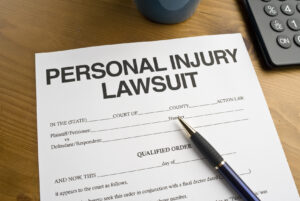
Colorado personal injury laws allow injured victims and their families to pursue claims against parties responsible for their injuries and damages. Injured parties can receive compensation for damages from the party who caused their injury. If another party caused you harm because of negligence, intentional torts, or other wrongful acts, you might wonder if you have a personal injury claim.
Things you should know about Colorado personal injury claims include:
What Is the Deadline for Filing Personal Injury Lawsuits in Colorado?

A statute of limitations sets a deadline for filing lawsuits. Each state sets the statute of limitations for personal injury lawsuits filed in their state.
Colorado Revised Statute §13-80-102 sets a two-year statute of limitations for most personal injury cases. If you do not file your lawsuit before the deadline, a judge can dismiss the lawsuit without considering whether you have a valid legal claim for damages.
It is important to note that there are exceptions to the statute of limitations that could change the deadline. Facts in your case could also extend or shorten the filing deadline.
The best way to protect your right to pursue a personal injury claim in court is to discuss your case with a Lakewood personal injury lawyer as soon as possible.
Damages Available in Personal Injury Cases in Colorado
Damages compensate you for the harm and injuries caused by another party. There are two types of compensatory damages in a personal injury case: economic and non-economic damages.
Economic damages compensate you for the expenses, costs, and financial losses incurred because you were injured.
Examples of damages in a Colorado personal injury case include:
- Medical bills and expenses
- Occupational, physical, and other rehabilitative therapies
- Property damage
- Out-of-pocket expenses
- Loss of income, including future lost wages and reductions in earning capacity
- Household services and personal care
- In-home nursing care
Non-economic damages compensate you for the suffering, pain, and distress you experience after a personal injury or accident.
Examples of non-economic damages in a Colorado personal injury case include:
- Impairments and scarring
- Emotional distress
- Loss of enjoyment of life
- Physical pain and suffering
- Mental anguish
- Scarring and disfigurement
- Diminished quality of life
Proof of economic damages includes bills, receipts, and invoices. However, proof of non-economic damages is more challenging. These damages are intangible, meaning there may not be physical evidence proving how much you suffered because of your injuries.
You can help your attorney prove non-economic damages by taking photographs of your injuries as you heal. Also, write down your pain levels, emotional state, and other details about your recovery in a pain and suffering journal.
How Much Is My Lakewood Personal Injury Case Worth?
How much your personal injury case is worth depends on the circumstances and facts of your case.
Factors that could affect how much money you receive for a personal injury claim include, but are not limited to:
- The duration of your recovery
- The types of injuries you sustained
- Whether you sustained a disabling condition or permanent impairment
- The severity of an impairment or disability
- Whether you can work to earn income
- The extent of scarring and disfigurement
- Your ability to resume ordinary daily activities and things you enjoy
- How your injuries impact your personal relationships
- The availability and amount of insurance coverage
- Your level of fault for causing the accident or your injury
- The strength of the evidence proving your claim
A Colorado personal injury attorney can analyze the factors of your case to determine how they impact the value of your damages. This can maximize the value of your damages to put as much money in your pocket as possible.
Can I Recover Compensation for Damages if I’m Partially to Blame for Causing My Injury?
Some states set a strict contributory fault law that prohibits injured victims from receiving compensation for damages if they share any liability for the cause of their injuries. However, Colorado uses a modified comparative negligence standard.
If you are more liable than the other party for the accident, the other party is not legally liable for your damages. In other words, you receive nothing for your damages. However, if you are less to blame than the defendant, you can recover damages. The amount of your damages is reduced by your level of fault.
For example, suppose a jury awards you $5 million for a truck accident lawsuit. However, the jurors determined you were 10% to blame for causing the truck crash. Instead of receiving $5 million for damages, the court would reduce the award by 10% or $500,000.
Proving Liability for a Personal Injury Case in Colorado
Most personal injury cases are based on negligence. A person who fails to use reasonable care can be negligent in causing someone harm. The elements of a negligence claim are:
- Legal duty of care
- Breach of duty
- Causation
- Damages
You must prove that the other party failed to meet the duty of care they owed to you. That failure resulted in your injury, and you sustained damages because of their breach of duty.
A Lakewood personal injury lawyer can thoroughly investigate your case to gather evidence proving the elements of a negligence claim. An experienced attorney can work with leading experts to gather additional evidence to support your claim when necessary.
How Much Does It Cost to Hire a Lakewood Personal Injury Attorney?
Many people are concerned about how they can afford to hire a personal injury lawyer in Lakewood, CO. The good news is that you can hire an attorney for no upfront money. Many personal injury attorneys accept cases for a contingency fee.
Instead of paying a retainer fee when you hire our law firm, we accept a percentage of the amount we recover for your case as our payment for legal services. In other words, the attorney does not receive fees until your case is won. The fees are based on how much is recovered for your case.
Schedule a Free Consultation With Our Lakewood Personal Injury Lawyers
Do you have questions about a personal injury case in Colorado? Call us today at (720) 912 7274 to schedule a free case evaluation with an experienced Lakewood personal injury attorney from Matos Personal Injury Lawyers. We’ll answer your questions about personal injury claims and discuss your legal options for recovering compensation for damages.
